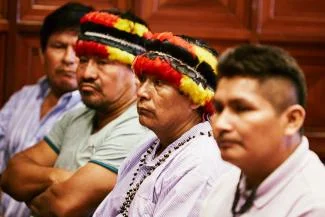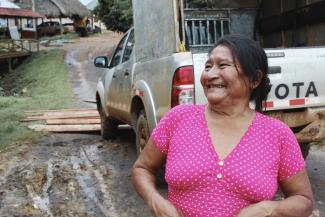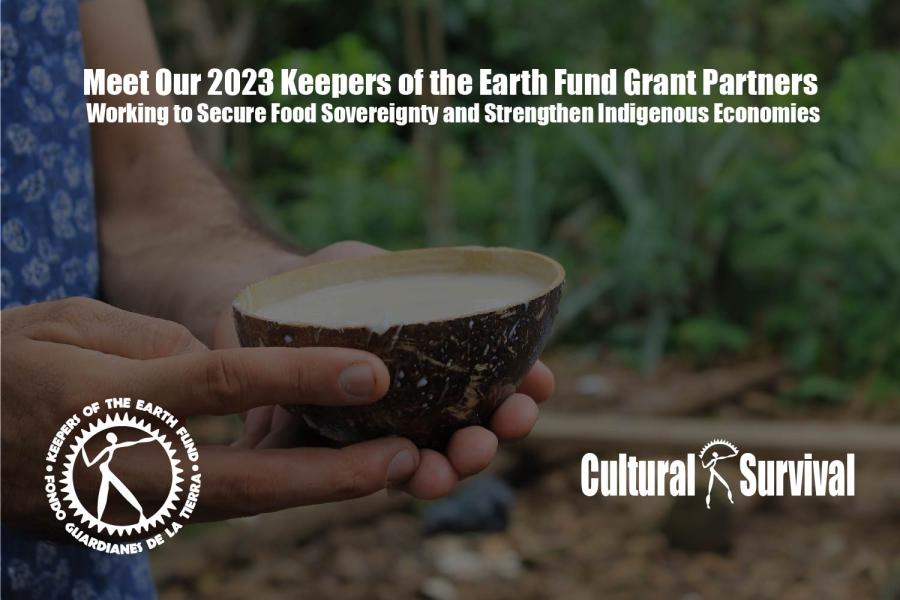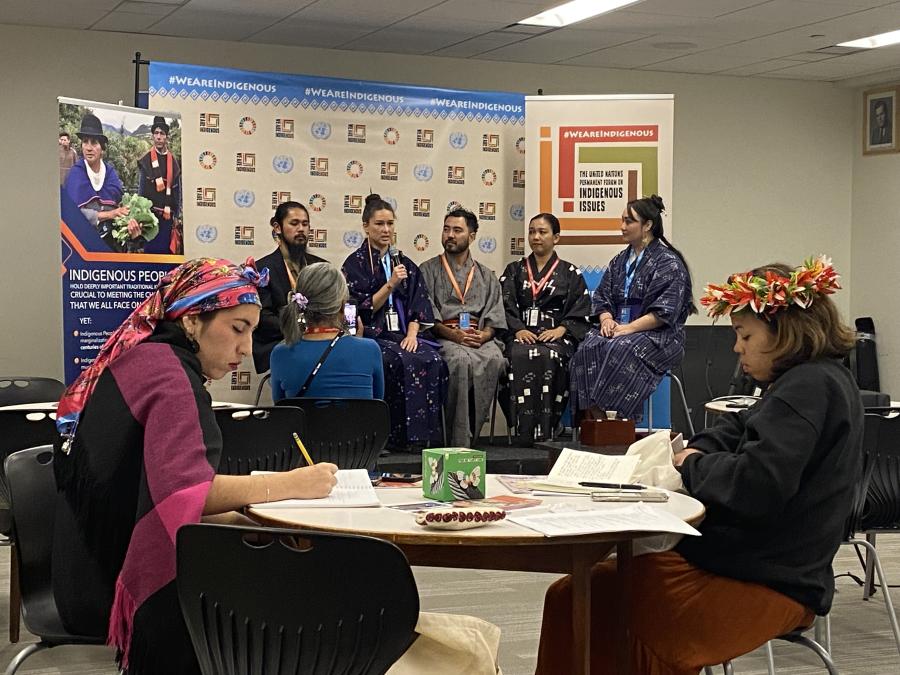

Big oil companies are notorious for their interest in maximizing return for their shareholders, but for too long Indigenous people have been paying the cost. The impact of extractive industries on Indigenous lands is indisputable, and no amount of money can compensate for the destruction of human life and contamination of water, air, and land. This holds especially true for the Achuar people of the Peruvian Amazon. Since the 1970s, the US-based company Occidental Petroleum (“Oxy”) has operated and drilled on Achuar lands in the Corrientes River Basin. According to the NGO Amazon Watch, for over three decades Oxy cut costs by dumping nine billion gallons of “produced waters” directly into rivers. These so-called waters contained dangerous and toxic substances such as barium, lead, and arsenic. Together with hundreds of oil spills, Oxy succeeded in destroying hunting and fishing grounds and leaving the Achuar with severe health problems.
“Adults and local children have tested positive for dangerously high blood-lead levels,” Amazon Watch found. “Local residents cite countless tales of unexplained diseases, tumors, skin ailments and miscarriages from oil exposure. Fish and local game are not fit for consumption and fraught with contamination, and the soil is also no longer fit to produce agricultural crops on which the Achuar depend for subsistence.” Oxy and other extractive industries threaten a way of life that the Achuar have enjoyed for thousands of years. The Amazon headwaters along the border of Peru and Ecuador, where the Achuar make their livelihood, are home to over 11,000 Indigenous people. Indigenous communities rely on the Corrientes, Pastaza, and Morona River basins for agriculture, hunting, and fishing. The rapid change that Oxy brought to this bio- diverse land threatened not only the livelihood of these remote communities, but also the integrity of the Amazonian ecosystem itself.
“Before, we could just drink straight from the river; we could drink from any stream. But it’s not like that now,” a man from Antioquía told NGO EarthRights International. “Now it’s a four to five hour walk to get fresh water. We knew some- thing was wrong, because the animals and the fish had been large before the companies got here. But now the fish are...very skinny. And when we gut the fish, the petroleum floods out.”
The Achuar, like many Indigenous Peoples, were tired of seeing their lands exploited for the benefit of foreign extractive companies, which often disregard international protocols and Indigenous autonomy in their practices. With the help of international NGOs and devoted activists, the Achuar took action against Oxy in the form of a legal suit against the company’s unlawful actions.
EarthRights International was a crucial force in this fight as an NGO whose mission aims to combine the power of law and the power of people in defense of human rights and the environment. In 2007, EarthRights and its co-counsel brought suit on behalf of 25 Indigenous Achuar plaintiffs from the Peruvian Amazon alleging egregious harm caused by the company. In its 2007 report A Legacy of Harm, EarthRights International and Amazon Watch chronicled the impact of the damage Oxy had wreaked upon the traditional lands of Achuar communities, including Pampa Hermosa, Sauki, Antioquia, Jose Olaya, and Nueva Jerusalem, and found that Occidental Petroleum had not only acted irresponsibly, but illegally. It did not conduct its oilfield pollution prevention practices in a manner consistent with US regulations (where Oxy is based), nor with any regard to the internationally- guaranteed human rights of the Achuar people. Like many extractive corporations, it failed to seek or obtain Free, Prior and Informed Consent from Indigenous communities in the area. “The company came and put lots of chemicals in [the river],” an Achuar community member told EarthRights International. “Animals that drank the water died. The com- pany said that the petroleum doesn’t cause sickness, but they tricked us. The chemicals are in the animals in the bush that we eat.”
This case, Maynas Carijano v. Occidental Petroleum, set an important legal precedent for Indigenous communities. Marissa Vahlsing, a member of EarthRights’ legal team, explained that the case also established several historical precedents; primarily it is one of the first times that communities have sought remuneration directly from a company implicated in environmental damage. “For whatever reason, it has been rare for communities to seek reparations against the company that caused the harm,” she stated. “One reason might be because human rights lawyers and Indigenous rights lawyers are more accustomed to using mechanisms that focus on state responsibility rather than on civil litigation strategies that target private actors. This case changed that model.”
The case went through a winding appeals process after initially being dismissed by the Federal District Court in Los Angeles in 2008 under the doctrine of “Forum Non Conveniens” (FNC), a judgement meaning that the case should be litigated in Peru. “In my experience, companies often seek to dismiss a case on FNC not because the courts in the other country are more convenient, but because they hope to make the action go away altogether,” Vahlsing said regarding the Court’s initial decision. “We have seen little evidence that few, if any, corporate accountability cases that are dismissed on FNC grounds from a US court are actually refiled in the country proposed by the defendant company.”
The Achuar plaintiffs appealed to the Ninth Circuit Court of Appeals arguing that the case should remain in the US. In December 2010 the Ninth Circuit reversed the district court’s earlier ruling, finding that the case should be tried in Los Angeles. After filing two petitions for a rehearing to the Ninth Circuit with no change in opinion, Oxy filed a petition for review with the US Supreme Court. On April 22, 2013, the Supreme Court denied the petition: the case would remain in the District Court of Los Angeles. Ultimately the case never came to trial as the Achuar reached a settlement with Oxy. In 2015, EarthRights International announced that the parties confirmed a mutual settlement of the claims in the litigation.
While this case was never litigated, Vahlsing concludes that it represents a success for Indigenous communities everywhere. “Oxy will provide assistance to enable these five Achuar communities to carry out community development projects for their benefit,” she said. “In March 2015, we were pleased to announce the creation of FODAC, the Fondo de Desarollo de Alto Corrientes/Upper Corrientes Development Fund, a registered Peruvian nonprofit association designed, managed, and run by the Achuar. Through FODAC, these five Achuar communities will receive and administer funds for community development projects, health projects, and education projects. We are excited and thrilled to see the Achuar in a position to carry out their own visions for the future of their communities through these projects.”
EarthRights International and Amazon Watch will con- tinue to stand with Indigenous communities in this fight, but hope that Maynas v. Occidental sends an important message to extractive companies regarding the power of Indigenous voices. The case should serve as an inspiration to all Indigenous people seeking to defend their rights and territories. “For me, one of the most powerful aspects of the case was the extent to which the communities drove the process from the beginning to the end, and how they will continue define their own future through the projects they undertake with FODAC,” Vahlsing said. “From the moment EarthRights International joined
this case, the Achuar were organized, they had clear goals, and they understood both the possibilities and limitations
of litigation. We worked alongside them for nearly a decade
to find ways to help them bring their experiences and lived histories before the courts, but the Achuar were the ones who sought out and fulfilled their own goals—not the lawyers.”
Photo courtesy of EarthRights International
Image One: (L-R): Plaintiffs at Lima press conference Lima: Julio Maynas (son of lead plaintiff Thomas Maynas), Apu Pedro Arly of Sauki, Apu Abel of Jose Olaya, and Hector Garcia Maynas of Pampa Hermosa.
Photo courtesy of Valentina Stackl
Image Two: Adolfina Garcia Sandi, one of the plaintiffs in her village, Jose Olaya. Sandi believes the two children she lost were victims of contaminated drinking water.


